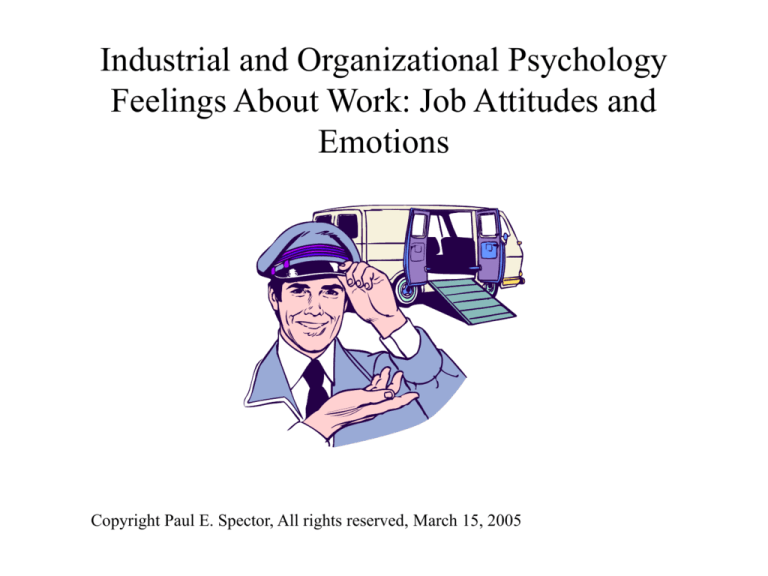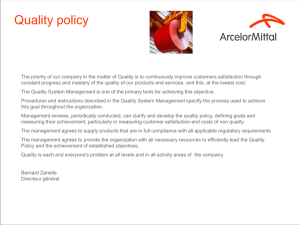
Industrial and Organizational Psychology
Feelings About Work: Job Attitudes and
Emotions
Copyright Paul E. Spector, All rights reserved, March 15, 2005
Feelings About Work
• Job satisfaction: Attitude about the job reflecting
like/dislike for it and various facets.
• Organizational commitment: Attachment to the job.
• Emotion: Reaction to a situation that includes both
physiological arousal and cognitive appraisal, e.g., anger or
anxiety.
Nature of Job Satisfaction
• Global approach: Overall satisfaction with work
• Facet approach: Satisfaction with aspects of the job
–
–
–
–
Pay
Promotion
Supervision
Nature of work
• Most people like the job overall
• Facet satisfactions vary
– Highest: Nature of work
– Lowest: Pay and Promotion opportunities
Mean levels of U.S. Satisfaction On the Job
Satisfaction Survey
Assessment
• Self-report survey
– Easy to use
– Can be anonymous
– Person best judge of own feelings
• Standard scales exist
– Job Descriptive Index (JDI)
• 5 facets of job satisfaction
– Job In General (JIG)
• Global job satisfaction
• Scales exist for commitment and emotion
Antecedents of Job Satisfaction:
Environmental
• Job characteristics
– Hackman & Oldham
– Characteristics Psychological States Job satisfaction
– Strong research support linking perceptions of characteristics to
job satisfaction
– Weak research support linking objective characteristics to job
satisfaction
• Pay
– Salary compared to people in same job more important than
different jobs
• Justice
– Distributive and Procedural related to global and facet satisfaction
Job Characteristics Theory
Antecedents of Job Satisfaction:
Environmental
• Personality
– Negative affectivity (high NAs less satisfied)
– Locus of control (externals less satisfied)
• Gender
– Few gender differences
• Age
– Curvilinear—satisfaction lowest age 26 to 31
• Culture and Ethnicity
– Few racial differences within the U.S.
– Western countries score higher than Asians
• Could be due to response styles rather than true feelings
Country Differences In Job Satisfaction
Facets On JSS
Facet
Dominican
Republic
Hong
Kong
Jamaica
Singapore
US
Pay
17.2
15.0
5.8
14.0
11.8
Supervision
20.0
16.0
17.5
13.4
18.6
Fringe Benefits
16.8
14.4
6.1
14.2
14.3
Coworkers
20.0
15.6
17.0
13.4
17.9
Work Itself
22.2
14.9
18.3
17.1
18.9
Total
160.9
133.3
110.0
134.7
133.4
Person-Job Fit
• Match between individual and the job
• People differ in reactions to same situation
• Characteristics of the person is a moderator
– Moderator: Variable that affects relationship between two other
variables
• Growth need strength (GNS)
– People high on GNS are more satisfied with high scope jobs
– People low on GNS are not more satisfied with high scope jobs
Moderating Effect of GNS On Relationship
Between Job Scope and Job Satisfaction
Effects of Job Satisfaction
• Job Performance
– Small correlation
– More evidence that performance causes satisfaction than reverse
• Turnover
– Dissatisfied people more likely to quit
– Moderated by labor market—people quit when they find another
job
• Absence
– Very small correlation—other factors more important
• Health and Well-Being
– Job satisfaction relates to health variables such as anxiety and
depression
• Life Satisfaction
– Job satisfaction important component of life satisfaction
– Spillover
Organizational Commitment
• One commitment, three components
–
–
–
–
Mowday, Steers, Porter
Acceptance of organization goals
Intention to stay on the job
Willingness to work hard
•
• Three commitments
–
–
–
–
Meyer and Allen
Affective: Like the job
Continuance: Need the job
Normative: Feel obligated to stay on the job
Commitment and Other Variables
• Similar correlations as job satisfaction
• High commitment associated with
–
–
–
–
High job scope
High job satisfaction
Low job stressors
Job Scope
Emotions and Work
• Emotion state: How you feel now
• Emotion mood: How you have been feeling lately
• Positive emotions: Feeling good
– Greater creativity
– Higher job satisfaction
– More contextual performance
• Negative emotions: Feeling bad
– Lower job satisfaction
– Higher absence
– More turnover
Emotional Labor
• Requirement at work to express or inhibit emotional
display
– Smiling at customers
– Not showing anger toward clients
• Some studies showed that acting happy can lead to job
satisfaction
• Emotional dissonance: Expressing emotion you don’t feel
– Leads to dissatisfaction and stress



